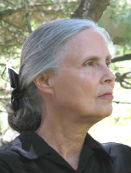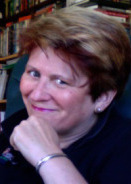Interview on Memoir Writing - Part 8
This is Part 8 of our conversation about memoir writing with Matilda Butler and Kendra Bonnett from WomensMemoirs.com. Click here to return to Part 1 of the conversation.
In this portion of our interview on memoir writing, we asked Matilda and Kendra about the process of writing their collective memoir, Rosie's Daughters: The "First Woman To" Generation Tells Its Story. Woven from the memories of women born during the World War II, Rosie's Daughters tells the story of a generation on the forefront of enormous changes. Rosie’s Daughters won an IPPY National Book Award in 2008.
A Conversation with Kendra Bonnett and Matilda Butler: Writing Rosie's Daughters
Creative Writing Now: What did you learn about the memoir form from writing Rosie‘s Daughters? What did you discover in the process that you didn’t know going in?
Advertisement:
Matilda: Well, going in I went in as a social scientist, so I learned everything. It was a turning point in my life. As I say, I was trained as a social scientist and I have a Ph.D. in Social Psychology, and I was really interested in the phenomenon of this generation of women born during World War II— the children of Rosie or Rosie’s Daughters, as we eventually called the book. Women born during World War II, that 1940 to 1945 period really were the ones that then became so different. They were the precursors of the baby boomers. So that’s why I talk now and Kendra doesn’t, because she is a Baby Boomer. Rosie’s daughters in that generation -- I was really interested because our experiences were so different from what we thought they would be, because we really thought that we would grow up and we would be wives and we would be mothers and we would stand behind our husbands and make them successful, and that is the way we were raised. And for women in that ten year period let’s say, right before us, that is the way that happened. And we came along, and we thought we would only really be wives and mothers, and then suddenly we became doctors and lawyers and college professors, and we had careers, and we had all these things.
Kendra: And Indian Chiefs.
Matilda: And Indian Chiefs, that’s right. The first ever Indian Chief female was a woman from that generation. So there were so many ways in which our lives are different, and I wanted to look at that and I thought, “Okay, I am a social scientist -- I know how to do this.” And I did a lot of reading. And then I did more than a hundred interviews, and I wanted to write this story. Then I started working with women and hearing their stories, and we had very long interviews, and they were really trusting me with their stories, and these were stories they had never told anyone. And they were saying, “Now, I want you to change my name because my husband doesn’t know that happened.” All these things came out, and the power of the story was so incredible. It was like this big light bulb went on. And I saw the importance of telling the stories because some women then would say to me, at the end, “Oh, I never realized that’s what I was doing. Ah, I kept doing the same thing. Now I get it.”
And, so people changed during the interview itself simply because they had the opportunity to look back at their own lives and see things that -- when you’re looking at the particulars, it looks different, but when you tell it, you begin to see the patterns yourself. And I had people who really changed in their outlook. And I had people for whom it was just a transformative process for them. It was definitely a transformative for me. I mean, I used to dream about these people all night long. And it was this incredible experience, and I came out of it as a memoirist. And so, I went in as a social scientist and I came out as a memoirist, because I realized the importance of the story—the importance of telling the story and the importance of owning our own stories.
Memoir is relevant to both women and men, but I focus on women because, even today, there is very much a sense that we all kind of carry around which is, “Oh, well. I just do all these things but my story doesn’t matter, my story doesn’t count, and anyone would do this, and it’s all fine; it’s about other people, it’s never about me.” So memoir is very important, and that’s why I teach it, and that’s why Kendra and I develop all these materials -- because we want to help woman be able to tell their stories. They matter to us, and they matter to other people. And I am so passionate about that. That’s really what came out of writing Rosie’s Daughters.
It is really a collective memoir because I am telling the story of many people, and usually you are just telling your own story. But you can tell a family story. There are a number of memoirs that are collective. One of the ones that I have liked is called Satellite Sisters’ Uncommon Senses. And it is five sisters, and they decide to write this book together, and they choose themes, and then each of them wrote their own little piece around that theme. And they are not contradicting each other and they are not saying, well it was this day versus that day. They are taking a theme and then what it meant to them. So some of them were growing-up themes and some of them now are more their adult-life themes. But there are these five sisters, and they live quite some distance apart from each other. Some live in Europe, and some live in the U.S. -- they don’t even all live in the U.S. together. One of the earlier chapters was called, “Sense of Connection,” and they tell their stories about what it is that has caused them to feel connected. So that’s a wonderful way of telling a story.
Sometimes you can get other family members to collaborate. We know another writer, Betty Auchard, who wrote a memoir called Dancing in My Nightgown, and she just has a brand new one out in which she is going back to her childhood, called The Home for the Friendless. That’s because, and one point, she and her brother were put into an orphanage when their parents divorced. And that was the name of the orphanage; it was called the Home for the Friendless. She sat down with her brother and she wrote the memoir, but they spent many months together going over it. She needed the additional memory of what were some of the things and how did they happen and did it go like this. Because in the in the same family, if you have siblings that are five years apart, they are going to remember it differently because it happened at a different time in their life.
And so I have had one person who said, “My sister wrote a memoir, and I don’t think that’s the way our lives were like at all, and that’s why I want to write mine.” In fact, even if the facts are the same, if you are fifteen and your sibling is ten, the same fact happening in the family is going to have a very different impact because we are at different points in our lives when we’re a ten year old and when we’re a fifteen year old, a teenager. So you can see why there can always be different perspectives. And sometimes you want to include someone else and get them involved, and at other times you definitely don’t want the other person involved. So all of those are valid things.
It was a turning point for us to write Rosie’s Daughters. Kendra and I have both given a number of presentations to women’s groups, and we always open it up at the end for them to tell their own stories, and the stories come tumbling out. And sometimes someone will begin to cry because it reminds them of some particular thing that happened in their life. And because these are multiple stories, it gives them the sense that they can tell their story too. It gives permission for other people to be able to tell their own stories. Or someone will stand up and talk about their mother that worked during the war.
So being able to share – that’s another aspect of it, and that’s really Kendra’s strength. Once you write, how do you share you story? Publishing is part of it, but also giving presentations -- even if you haven’t published, but certainly if you have -- finding groups and being able to talk to them is an important part of the whole process. The process is more than just the writing. And, actually, that’s part of the fun of it, the sharing part.

Kendra: I think that we live in a time where we are so busy that we don’t take any time to reflect on what we’ve done. Something that was unfortunate or sad or bad or whatever, we tend to want to bury it and move on, and we try to think that will make us healthier people. Or, if it’s really bad, you will go and seek therapeutic help working through something with a therapist, particularly if it keeps coming up. This is sort of a therapeutic process in its own, but I think just average, everyday, ordinary people, all of whom have a story worth sharing and telling, just don’t take the time to reflect on it. I think that’s why these stories were so powerful when Matilda was doing the interviews because these people hadn’t taken the time to think these things through, and then when they started they almost couldn’t stop.
The thing, though, that I learned from Rosie’s Daughters was very, very different from Matilda, and that is, when a very good friend comes up to you with a manuscript and says, “I’d like for you to read this,” run. Just, run.
This memoir became known as the monkey on my back. Because, you cannot imagine… Neither one of us had written a memoir, and we had a lot to learn. We have very creative, very inventive minds and we had some pretty exotic things going on in this memoir—even more so than what finally ended up in there because there are so many threads going through Rosie’s Daughters. But, my goodness, we had some pretty wild things going on.
We had one chapter that dealt with the future as in what was it like in the year 3015 or something like that. It was way, way off in the future. We had a series of made-up letters that were reflective of stories that Matilda had collected. But we had mixed them and matched them and conflated them and chopped them, and melded them together into the story of five or six women who shared letters throughout the years. Every five years, there would be one of these letters published, and it was following their lives and the ups and downs, and it was a way to make the narrative more creative and maybe more interesting. We had to end up taking all of that stuff out. We were just giving voice to all kinds of wild forms of imagination, but it was worthwhile. It was very worthwhile.
Click here for more information about Rosie's Daughters.
Memoir Writing - Next Steps
Join our memoir writing class.
Read our interview with Heather Sellers about memoir writing.
See a list of all pages on how to write a memoir.
<< BACK from Memoir Writing to Creative Writing Now Home